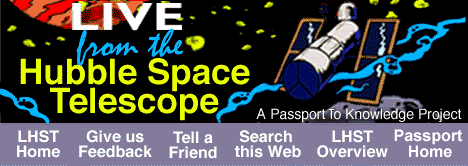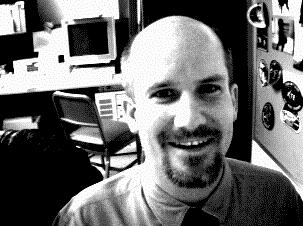


Hi, I'm Andrew (Andy) Dougherty, the Hubble Space Telescope (HST) Observatory Systems Manager. This means that I am responsible for the health and safety of the HST as a whole, and ensuring the correct operation of the major subsystems on the HST.
I graduated from The University of Texas in Austin in 1983. I have a bachelors degree in Aerospace Engineering. My first job out of college was working on the Space Shuttle Program at the Johnson Space Center. I performed trajectory analysis for missions when the Shuttle was retrieving other satellites. I worked my way up until I was one of those people you see in the Mission Control Center. I worked directly on about 15 missions before I moved to HST.
As an engineering manager I spend a lot of time coordinating work efforts
among
a wide variety of people. To see why I do this you need to know that the
HST is
a very complex machine. To make it easier for us to keep track of all the
pieces, we break the HST up into subsystems. Our subsystem divisions are:
1. Data Management System (DMS) - this subsystem is made up of the flight
computers, data processors, tape recorders, and other items that handle or
process data.
2. Electrical Power System (EPS) - this subsystem is made up of the solar
arrays
and batteries primarily. We also include all mechanical systems in this area,
such as the motors that open the aperture door and deploy the High Gain
Antennas.
3. Instrumentation and Communication - this subsystem is made up of the High
Gain Antennas (steerable dish antennas), Low Gain Antennas (fixed
antennas that
cover an entire hemisphere), and the transmitter and receivers that allow
us to
send commands to the HST and get back all the great science data.
4. Thermal System (Thermal) - this subsystem is comprised of heaters and
insulators. It keeps the hot parts (they point at the sun) cold and the cold
parts (they point away from the sun) hot.
5. Science Instrument System (SI) - this subsystem is responsible for
providing commands to and getting data from the science instruments. The
instruments themselves are 'operated' by the STScI in Baltimore, but we are
responsible for their health and safety. For example, making sure they are
not too hot, have the right information sent to the ground etc.
I'm sure you can see that making changes in one area can impact another area. My job is to make sure that the individual areas are fully coordinated so that nothing unexpected happens.
I got interested in a technical career early on when I was very interested in airplanes and what made them 'fly.' Later I was inspired by the Apollo space activities and fully hooked on a career in this area. Going through jr and high school, math and other analytical classes were the ones I did best in (I am terrible at memorizing 'stuff' like they make you do in history). I was always better at figuring out how things worked rather than getting interested in how they worked, which in my mind is the difference between engineers and physicists or scientists.
The best thing about my job is finding a problem (or having one find you as sometimes happens), investigating how and why it happened, putting the puzzle together and coming up with the reason why it happened and what we can do to work around it or fix it.
The least favorite job related activity is politics - although paperwork is also at the bottom. Remember that you will probably always have a boss and the boss, right or wrong, has the last word. But you never let them do something that would be totally wrong.
The best way to prepare for a technical career (or any career for that matter) is to read a wide variety of books and do good in school (I didn't say study hard - some people don't have to study hard to do good). With this background you can make a career decision late - even in college - without a big impact. Other than that, being a young kid and enjoying life is what it is all about until late high school or college. By being well read and having done well in school, you have established a base that can be built upon in nearly any direction - be it a technical career like mine or a non-technical one like a history teacher. By 17 or 18 though you should have some idea of what interests you and what you might like to do in the future.
In high school, my math and science teachers were my best influences because they wanted me to learn how to apply a principle to understand the next step in the process. Even today, I use these techniques to deduce why something happened differently than expected.
I am 34 years old and have too many hobbies, like scuba diving, hiking, hunting, bicycling, softball, and cards (everyone has to have at least one vice). My wife, Mandy, and I live in Silver Spring, Maryland. We both love to travel and when work allows do as much as we can.

![]()